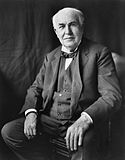Thomas A. Edison Quote
Suffered then, as now he suffers not so much because of what he wrote as from the misinterpretations of others...He disbelieved the ancient myths and miracles taught by established creeds. But the attacks on those creeds - or on persons devoted to them - have served to darken his memory, casting a shadow across the closing years of his life.When termed a 'dirty little atheist' he surely spoke from lack of understanding. It was a stricture, an inaccurate charge of the sort that has dimmed the greatness of this eminent American. But the true measure of his stature will yet be appreciated. The torch which he handed on will not be extinguished. If had ceased his writings with 'The Rights of Man' he would have been hailed today as one of the two or three outstanding figures of the Revolution. But 'The Age of Reason' cost him glory at the hands of his countrymen - a greater loss to them than to .I was always interested in the inventor. He conceived and designed the iron bridge and the hollow candle; the principle of the modern central draught burner. The man had a sort of universal genius. He was interested in a diversity of things; but his special creed, his first thought, was liberty.Traducers have said that he spent his last days drinking in pothouses. They have pictured him as a wicked old man coming to a sorry end. But I am persuaded that must have looked with magnanimity and sorrow on the attacks of his countrymen. That those attacks have continued down to our day, with scarcely any abatement, is an indication of how strong prejudice, when once aroused, may become. It has been a custom in some quarters to hold up as an example of everything bad.The memory of will outlive all this. No man who helped to lay the foundations of our liberty - who stepped forth as the champion of so difficult a cause - can be permanently obscured by such attacks. should be read by his countrymen. I commend his fame to their hands.{}
Suffered then, as now he suffers not so much because of what he wrote as from the misinterpretations of others...He disbelieved the ancient myths and miracles taught by established creeds. But the attacks on those creeds - or on persons devoted to them - have served to darken his memory, casting a shadow across the closing years of his life.When termed a 'dirty little atheist' he surely spoke from lack of understanding. It was a stricture, an inaccurate charge of the sort that has dimmed the greatness of this eminent American. But the true measure of his stature will yet be appreciated. The torch which he handed on will not be extinguished. If had ceased his writings with 'The Rights of Man' he would have been hailed today as one of the two or three outstanding figures of the Revolution. But 'The Age of Reason' cost him glory at the hands of his countrymen - a greater loss to them than to .I was always interested in the inventor. He conceived and designed the iron bridge and the hollow candle; the principle of the modern central draught burner. The man had a sort of universal genius. He was interested in a diversity of things; but his special creed, his first thought, was liberty.Traducers have said that he spent his last days drinking in pothouses. They have pictured him as a wicked old man coming to a sorry end. But I am persuaded that must have looked with magnanimity and sorrow on the attacks of his countrymen. That those attacks have continued down to our day, with scarcely any abatement, is an indication of how strong prejudice, when once aroused, may become. It has been a custom in some quarters to hold up as an example of everything bad.The memory of will outlive all this. No man who helped to lay the foundations of our liberty - who stepped forth as the champion of so difficult a cause - can be permanently obscured by such attacks. should be read by his countrymen. I commend his fame to their hands.{}
Related Quotes
I think that God that we have created and allowed to shape our culture through, essentially Christian theology is a pretty villainous creature. I think that one of the things that male patriarchal fig...
About Thomas A. Edison
Edison was raised in the American Midwest. Early in his career he worked as a telegraph operator, which inspired some of his earliest inventions. In 1876, he established his first laboratory facility in Menlo Park, New Jersey, where many of his early inventions were developed. He later established a botanical laboratory in Fort Myers, Florida, in collaboration with businessmen Henry Ford and Harvey S. Firestone, and a laboratory in West Orange, New Jersey, that featured the world's first film studio, the Black Maria. With 1,093 US patents in his name, as well as patents in other countries, Edison is regarded as the most prolific inventor in American history. Edison married twice and fathered six children. He died in 1931 due to complications from diabetes.
